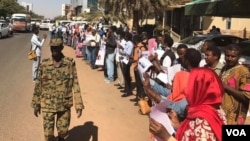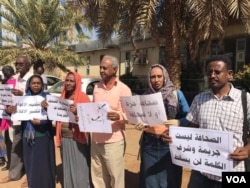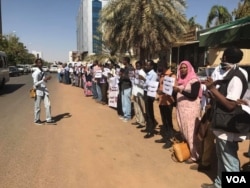Journalists in Sudan took to the streets Thursday to protest a move by government security agents this week that blocked distribution of the Sudanese Al-Jareeda newspaper.
The journalists demanded that the government respect their constitutional rights of freedom of the press and freedom of speech.
The group demonstrated in front of the National Council for Press and Publications, or NCPP, in Khartoum. The NCPP is a Sudanese government agency that creates rules for Sudanese journalists and administers licenses to government-approved journalists. A large number of NCPP members are appointed by the president, according to Freedom House, a human rights organization based in Washington, D.C.
Ahmed Elshiekh, a senior editor at Al-Jareeda, said his newspaper does not have a political agenda and insisted its reporters are only trying to inform citizens about what is happening in their country.
"Al-Jareeda is independent, fair and not partisan to any political party,” Elshiekh said. “It published news. When [a] youth movement called for civil disobedience, we wrote many news stories about it. … the government become angry although we talked with many government officials, so it punished us."
Elshiekh said the National Intelligence and Security Service, or NISS, ordered the newspaper's managers not to publish two writers’ columns.
Faisal Elbagir, coordinator of the group Journalists for Human Rights, said this is not the first time the NISS has confiscated newspapers or prohibited news outlets from publishing. He said confiscating papers before they hit the newsstands creates a financial burden because media houses are not able to make money off confiscated papers.
Such action is illegal, he stressed.
“It Is against the law. It is against the constitution of Sudan, because freedom of expression and freedom of press is granted by the constitution,” Elbagir said. “But … the National [Intelligence and] Security Service in Sudan, they are beyond the laws and don't care about respecting [the] right of freedom of expression."
The protesting journalists in Khartoum wrote a letter to the NCPP detailing their complaints regarding violations of press freedoms. The press status in Sudan is "not free," according to Freedom House, which adds that Khartoum authorities "maintain a tight grip on Sudan's media sector."
Al-Jareeda newspapers have been confiscated 11 times in December alone from newsstands across Khartoum.






